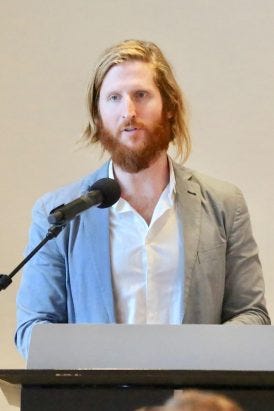UM professor in Israel flap seeks 'respect' as furor grows
 Kim Kozlowski
Kim Kozlowski
Ann Arbor — John Cheney-Lippold would prefer to talk about issues in the region of Israel and Palestine that he views as oppressive to Palestinians.
Instead, the University of Michigan associate professor in recent days has been recounting the deluge of email from people who have hurled lewd racial and sexual epithets at him after he declined to write a recommendation letter for a student wanting to study in Israel. His reason: He wanted to stand in solidarity with Palestinians, who accuse Israel of human rights violations.
Some email messages included threats to kill him, he said, by methods such as dropping him out of a helicopter, reminiscent of tactics used during Argentina's Dirty War in the 1970s.
Cheney-Lippold sees his decision as part of his right to free speech, saying it's not unlike other resistance movements throughout history, such as the American civil rights and South African anti-apartheid movements.
But he never expected it to catapult him from a little-known UM professor into a voice that is drawing criticism nationally and abroad, even as others in the Palestinian-led BDS movement (Boycott, Divest, Sanctions) cheer his stand.
"I understand that it is a controversial issue where people have very strong opinions on every side of this issue," Cheney-Lippold said in an interview Thursday with The Detroit News. "I respect people's opinions. I disagree with them fully. But I respect them in the way that I wish they would respect mine."
But others, including UM regents on both sides of the political spectrum, have referred to the associate professor's action as inappropriate in an institution of higher education and also called it "anti-semitic."

During the UM Board of Regents meeting on Thursday, Regent Denise Ilitch said Cheney-Lippold's action does not reflect the values of the university.
"At the University of Michigan, the best interest of our students is paramount," said Ilitch. "This type of profoundly exclusionary conduct by a University of Michigan professor flies completely against our mission. Let's call this what it really is: anti-semitic. It impairs and interferes with our students' ability to reach (their) educational aspirations."
UM president Mark Schlissel also spoke for the first time about the issue during the meeting, saying that the regents, executive leaders and others are looking into the issue, examining the broader questions it has stirred and taking steps to address the situation.
"I will state again: the University of Michigan strongly opposes a boycott of Israeli academic institutions," Schlissel said. "The academic aspirations of our students – and their academic freedom – are fundamental to the University of Michigan, and our teaching and research missions.
"We are committed as an institution to support our students’ academic growth," Schlissel continued. "We are a large and diverse public university, and the individual opinions of our community range widely on many issues. But personal views and politics should never interfere with our support of students. It is counter to our values and expectations as an institution."
More: UM's Schlissel gets 5-year contract extension, 3.5% raise
After the meeting, Regent Andrea Fischer Newman added that the issue has provoked many in the community, including Jews, parents and others concerned with how politics can impact the education of a student.
"This is not a First Amendment issue," said Fischer Newman. "This is an educational issue ... It is inappropriate to use a student as a platform for your politics. It is really inappropriate. He is entitled to his politics. But you can't use a student to do that."
The student who requested the letter, Abigail Ingber, who was a student in one of Cheney-Lippold's classes, declined via email to comment on the issue to The News, adding she will in the the future.
Cheney-Lippold said he has been surprised by the reaction to his decision. He learned on Sunday from Alexandra Minna Stern, chair of the American Culture department, that things might escalate.
"The student had gone to the president, sent an email to him and was going to have a meeting with (a) dean," Cheney-Lippold said.
Over the weekend, he said he started getting an increasing number of hate mail messages, including death threats, as his email address started getting spread in social media.
"This is a coordinated campaign," he said. "All of this intentional ... it's trying to unsettle you. It's trying to shut down speech through intimidation."
On Monday, UM released a statement that distanced the university from his action.
Cheney-Lippold initially agreed to write a letter of recommendation for the student, then changed his mind when learned she wanted to study at Tel Aviv University. He said the Israel university has many discriminatory practices, including barring students who would support BDS, a group started in 2005 by Palestinian civil organizations.
He initially characterized the academic boycott as a policy of UM. But Cheney-Lippold said he meant he was personally embracing the boycott called by BDS.
He said there are many professors who decline to write letters of recommendation.
"The Constitution does not compel one to speak," Cheney-Lippold said.
A soft-spoken man, the professor used words like "sweet" and "honest" to characterize the email he wrote to Ingber declining to write a recommendation letter for her.
Cheney-Lippold came to UM in 2011 and received tenure this year as an associate professor of American studies and digital studies.
He grew up in Des Moines and has a bachelor's degree from American University in Washington, D.C., and a doctoral degree in communications from the University of Southern California in Los Angeles.
"I was not necessarily interested in being an academic but in the academic pursuit," Cheney-Lippold said. "I wanted to have space to answer questions that I find really interesting and useful to how we can make the world a better place."
Cheney-Lippold said Ingber's request was not the first time he has been asked by a student to write a letter of recommendation for study in Israel. Two other students asked before Ingber, and he wrote letters for them.
"I wrote for them because I did not have tenure," said Cheney-Lippold. "I know how people are treated without tenure."
At the same time, Cheney-Lippold did not expect the issue to thrust him into the limelight. He has reported the threats to UM's public safety department and is continuing to teach and advise students. He said he has not heard from the Schlissel or any regents, but he had a meeting Thursday with Elizabeth Cole, interim dean of UM's College of Literature, Science and the Arts.
He said he cares deeply about many other groups that he views as marginalized and said he is grateful to those who have supported him.
"I hope that this helps us talk about human rights more profoundly, and vocally," he said. "I hope it doesn't keep (focusing) on me. I hope it extends to actual human rights abuses. To focus just on me is to focus on the horse race ... there are many more substantial things to talk about."
kkozlowski@detroitnews.com